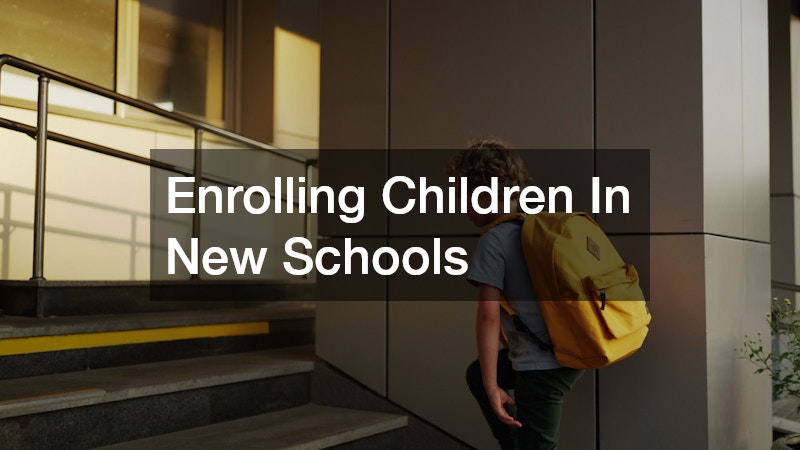Moving to a new state is an exciting yet challenging experience. Whether it’s for work, family, or a fresh start, relocating involves more than just transporting belongings. It requires adjusting to a new environment, establishing routines, and building connections from scratch. With proper planning and resources, your transition can be smooth, fulfilling, and even enjoyable. This guide provides practical advice to help you navigate every stage of settling into a new state, from finding a home to enrolling children in the best schools.
How To Settle Into A New Community

Moving to a new state can feel isolating initially, but engaging with your community can foster a sense of belonging. Connecting with people who share your interests or values creates a support system that enhances your overall experience.
Finding Local Meetups
Meetups are a fantastic way to meet like-minded people in your area. Websites and apps dedicated to local gatherings allow you to search by interests such as sports, hobbies, or professional networking.
Exploring Local Events And Activities

Local events provide an opportunity to experience the culture and character of your new area. Farmers’ markets, fairs, concerts, and seasonal festivals offer insights into the community while making it easier to connect with neighbors.
Engaging With Neighbors
Introducing yourself to neighbors can create a friendly and supportive living environment. Simple gestures like a greeting, small talk, or inviting neighbors for coffee can lay the foundation for long-term relationships.
Joining Community Organizations
Community organizations such as clubs, advocacy groups, or hobby associations are excellent avenues to meet people with shared interests. Volunteering for these organizations not only builds friendships but also enhances your understanding of local needs and culture.
Volunteering Opportunities
Volunteering provides both social and personal benefits. By offering your time to local charities or community projects, you gain a sense of purpose while expanding your network. It’s also a practical way to contribute to your new neighborhood and foster a sense of belonging.
Establishing A Comfortable Living Arrangement
A stable and comfortable home is the cornerstone of a smooth transition. Selecting the right neighborhood, setting up utilities, and ensuring home security are key steps to creating a welcoming environment.
Choosing The Right Neighborhood
Selecting the ideal neighborhood involves considering factors such as safety, proximity to work, and access to amenities. Families may prioritize areas near the best schools, while others may focus on convenience to shopping, entertainment, or public transportation. Researching neighborhoods online and visiting in person helps ensure a choice that aligns with your lifestyle.
Setting Up Utilities
Before fully settling in, it’s essential to set up utilities including electricity, water, internet, and gas. Contacting service providers in advance ensures that your home is functional from day one. A reliable setup helps reduce stress and allows you to focus on other aspects of moving.
Furnishing Your New Home
Furnishing your home to suit your tastes makes it feel welcoming. You can combine new items with belongings transported by your movers or moving company, and arranging furniture thoughtfully optimizes space and functionality.
Finding Nearby Amenities
Locating nearby grocery stores, pharmacies, restaurants, and other amenities simplifies daily life. Being aware of these essentials early allows you to navigate your new surroundings efficiently and enjoyably.
Home Security Considerations
Securing your home is a crucial step after moving. Engaging a locksmith services provider can ensure all doors and locks are functioning properly. Additionally, consulting a fencing contractor about home fencing or installing security systems enhances both safety and peace of mind.
Navigating The Job Market

Adapting to a new state often includes finding suitable employment. Understanding the local job market, networking, and updating your credentials increase your chances of securing fulfilling work.
Updating Your Resume For Local Opportunities
Tailoring your resume for local employers is essential. Highlighting relevant skills and experience while aligning with regional expectations can make a strong impression. Researching prominent companies and industry trends in your area provides context for strategic updates.
Using Online Job Platforms
Online job platforms simplify the search for new opportunities. Many sites allow filtering by location, role, and industry, helping you identify positions that match your qualifications. Additionally, signing up for job alerts keeps you informed of new postings in real time.
Networking Locally
Networking remains one of the most effective ways to discover employment opportunities. Attending professional events, joining industry-specific associations, or meeting people through local meetups can connect you with decision-makers and mentors who understand your field.
Understanding State Employment Laws
Each state has unique employment regulations regarding wages, benefits, and workplace rights. Familiarizing yourself with these laws ensures compliance and helps you advocate for your rights effectively. Consulting with local experts or online resources is advisable.
Continuing Education And Certifications
Pursuing additional education or certifications relevant to your career can strengthen your qualifications. Local community colleges, universities, and professional programs provide options for continuing education that may enhance your job prospects.
Registering Your Vehicle And Obtaining A Driver’s License
Relocating requires updating vehicle registration and obtaining a driver’s license in your new state. These steps are essential for legal compliance and smooth transportation.
Required Documentation
Prepare documents such as proof of residence, identification, and vehicle titles before visiting the DMV. Having all necessary paperwork ready minimizes delays and ensures a smooth registration process.
Finding The Closest DMV
Locating a nearby DMV or licensing office is critical. Some offices allow appointments, which can significantly reduce waiting times. Checking online for services offered ensures you go prepared.
Vehicle Inspection Requirements
Many states require vehicle inspections before registration. Understanding these regulations in advance ensures your car meets all safety and emissions standards, avoiding unnecessary penalties.
Understanding State Driving Laws
State-specific traffic regulations may differ from your previous state. Familiarizing yourself with speed limits, road rules, and licensing requirements helps prevent fines and enhances driving safety.
Updating Your Car Insurance
Transferring or updating your car insurance to meet state requirements protects you legally and financially. Contacting your provider early ensures continuous coverage and compliance with local laws.
Exploring Local Healthcare Options
Access to quality healthcare is a priority when moving. Identifying providers, understanding insurance options, and knowing emergency services are essential for your well-being.
Finding A Primary Care Physician
Selecting a primary care physician allows you to establish consistent healthcare. Recommendations from neighbors, online reviews, or local directories can guide your decision, ensuring access to reliable care.
Understanding Health Insurance In Your State
Insurance policies vary by state, affecting coverage, premiums, and networks. Understanding these differences ensures that you select the most appropriate plan for your needs.
Locating Nearby Pharmacies
Knowing where local pharmacies are located facilitates prescription refills and over-the-counter medication purchases. Establishing a relationship with a local pharmacy can also improve access to professional guidance.
Emergency Services And Hospitals
Familiarize yourself with nearby hospitals, urgent care centers, and emergency services. Knowing the fastest routes and contact information is vital in urgent situations.
Mental Health Resources
Access to mental health support is crucial during a major life transition. Local therapists, counseling centers, and community support groups can provide guidance and assistance as you adjust to your new environment.
Setting Up Financial And Banking Services
Managing finances effectively in a new state lays the foundation for long-term stability. Local banking, tax understanding, and budgeting are key elements of financial health. Many people use a storage company to temporarily house belongings during the transition, which can affect budgeting for moving services and residential packing services.
Opening A Local Bank Account
Opening an account with a local bank simplifies bill payments, deposits, and withdrawals. Choosing a bank with accessible branches and convenient online services ensures a smooth financial transition.
Understanding State Taxes
Different states have varying tax structures. Familiarizing yourself with income tax rates, property taxes, and filing requirements helps you plan finances accurately and avoid penalties.
Hiring A Local Financial Advisor
A local financial advisor can provide guidance on budgeting, investments, and financial planning tailored to your new state. Their expertise ensures you make informed decisions aligned with your long-term goals.
Managing Moving Expenses And Budgeting
Relocating involves numerous costs, from moving services and residential packing services to setting up utilities and furnishings. Planning and tracking these expenses keeps your budget on track and prevents unnecessary financial stress.
Exploring Investment Opportunities In Your New State
New locations may offer unique investment opportunities, from real estate to local businesses. Consulting experts and researching the market can help you capitalize on opportunities for growth and financial security.
Enrolling Children In New Schools

For families, selecting and enrolling children in the best schools is a priority. Proper planning ensures a smooth academic transition and continued educational success.
Researching School Districts
Investigate school ratings, programs, and extracurricular offerings in potential neighborhoods. Access to the best schools can influence long-term academic outcomes and overall family satisfaction.
Understanding Enrollment Requirements
Each district may have specific enrollment procedures, including documentation and deadlines. Being aware of these requirements ensures your children are registered without unnecessary delays.
Connecting With PTA And Other Parents
Building connections with parents and joining the PTA fosters involvement in your child’s education. Engaging with other families helps create a support system and keeps you informed about school events.
Educational Resources And Support
Many schools provide additional academic resources, including tutoring, counseling, and technology access. Leveraging these tools enhances your child’s learning experience and integration into a new educational environment.
Extracurricular Activities And Clubs
Encouraging children to participate in clubs, sports, or arts programs helps them develop social skills and a sense of belonging. These activities enrich their experience and facilitate friendships outside the classroom.
Building A Social Network
A robust social network is essential for emotional well-being and community integration. Connections made through multiple channels create lasting relationships and a sense of belonging.
Connecting Via Social Media
Social media platforms can help locate local groups, events, and interest-based communities. Joining regional online communities provides information and opportunities to meet people in person.
Joining Local Interest Groups
Interest-based organizations such as book clubs, fitness classes, or hobby groups create a natural environment for forming friendships. Shared passions often lead to deeper connections and long-term engagement.
Establishing A Support System
A reliable support system of friends, colleagues, and neighbors is crucial during a transition. Maintaining contact and nurturing these relationships ensures emotional and practical assistance when needed.
Exploring Social Opportunities At Work
Workplace social events and professional networks offer opportunities to meet peers and mentors. Engaging in these activities strengthens professional relationships and personal connections.
Meeting People Through Hobbies
Hobbies are an effective way to meet like-minded individuals. Classes, workshops, and recreational activities not only provide enjoyment but also facilitate social bonding.
Understanding State Laws And Regulations
Being aware of state-specific laws and regulations protects your rights and ensures compliance. Knowledge of legal frameworks allows smoother adaptation to your new environment.
Familiarizing With Tenant Rights
If you are renting, understanding tenant rights protects you from unfair practices and disputes. State-specific laws cover areas like lease agreements, security deposits, and eviction procedures.
State-Specific Business Laws
For business owners or entrepreneurs, local regulations can impact operations. Familiarity with licensing, permits, and tax obligations prevents legal issues and supports compliance.
The Importance Of Legal Assistance
Access to qualified legal assistance is valuable for navigating unfamiliar laws. Attorneys can provide guidance on contracts, real estate loans, or disputes, ensuring informed decision-making.
Environmental And Wildlife Laws
Each state may have unique environmental and wildlife regulations. Awareness of these rules is essential for compliance in areas like landscaping, pet ownership, or property maintenance, especially if engaging a fencing contractor or home fencing services.
Voting And Civic Responsibilities
Registering to vote and understanding civic responsibilities enable active participation in local governance. Engaging in civic life fosters community integration and awareness of local issues.
Exploring Transportation Options
Transportation is a critical aspect of adapting to a new state. Familiarity with available options improves mobility and convenience.
Public Transit Systems
Understanding the local public transit system ensures cost-effective and efficient commuting. Bus, train, and subway options vary by state, so familiarizing yourself with schedules and routes is essential.
Carpooling And Rideshare Services
Carpooling and rideshare services offer flexible transportation alternatives, reducing commuting costs and environmental impact. These options are particularly useful while exploring a new city or region.
Biking Routes And Regulations
Many states encourage cycling as a sustainable transport option. Awareness of local biking routes, safety rules, and traffic laws ensures a safe and enjoyable experience for cyclists.
Long-Distance Travel Options
If family or work requires travel, understanding long-distance transportation options such as trains, buses, or flights facilitates planning and convenience. Access to reliable travel networks enhances flexibility.
Accessibility For People With Disabilities
Ensuring accessible transportation is crucial for individuals with disabilities. Awareness of services, routes, and accommodations ensures mobility and independence.
Relocating to a new state is a journey filled with excitement, challenges, and opportunities for personal growth. From establishing a comfortable living arrangement and enrolling children in the best schools to connecting with your community and understanding local laws, each step contributes to a successful transition. Patience, openness to change, and proactive engagement are essential to making your new state feel like home. By embracing the experience fully, you can build a fulfilling life and start fresh with confidence.



